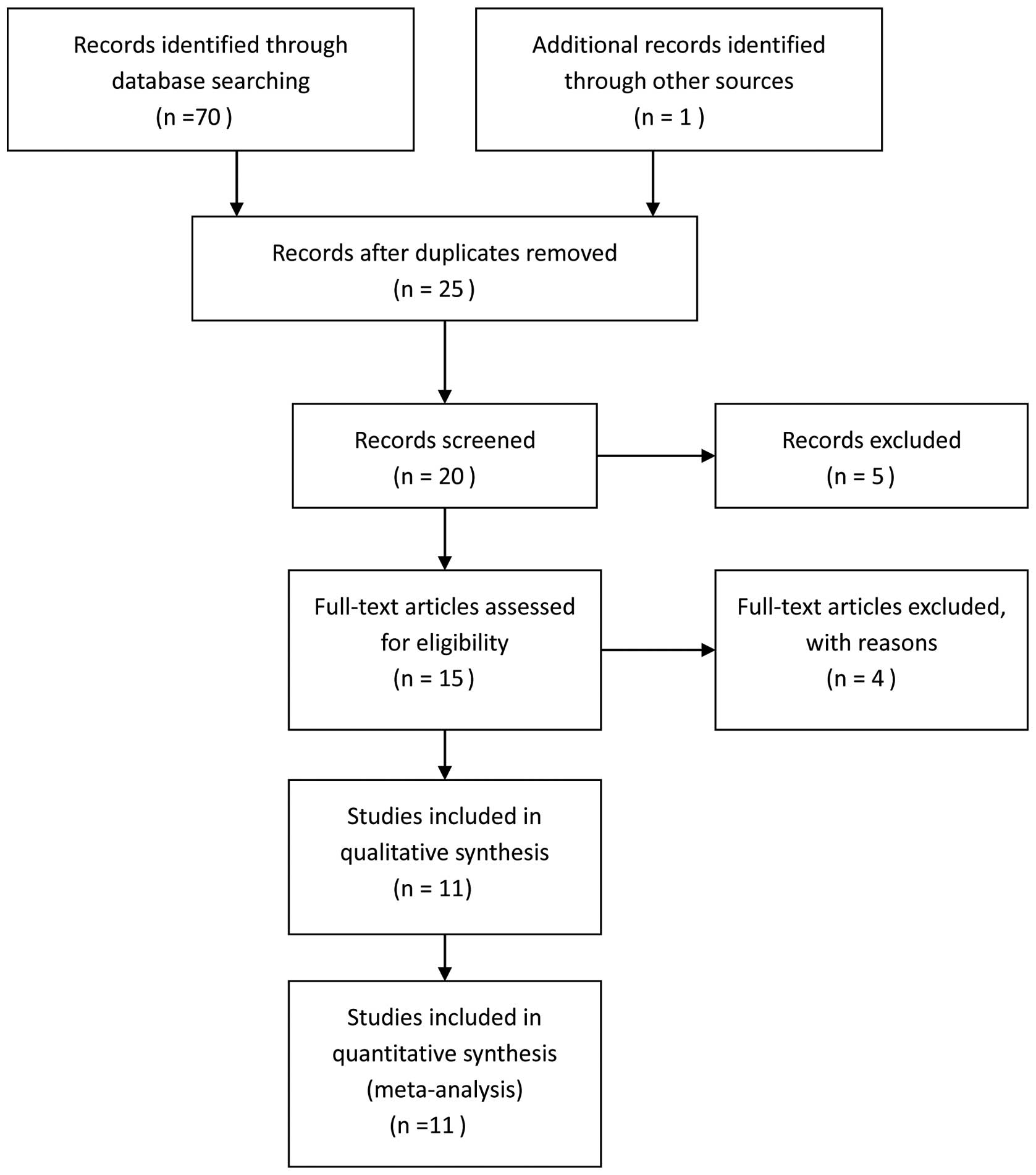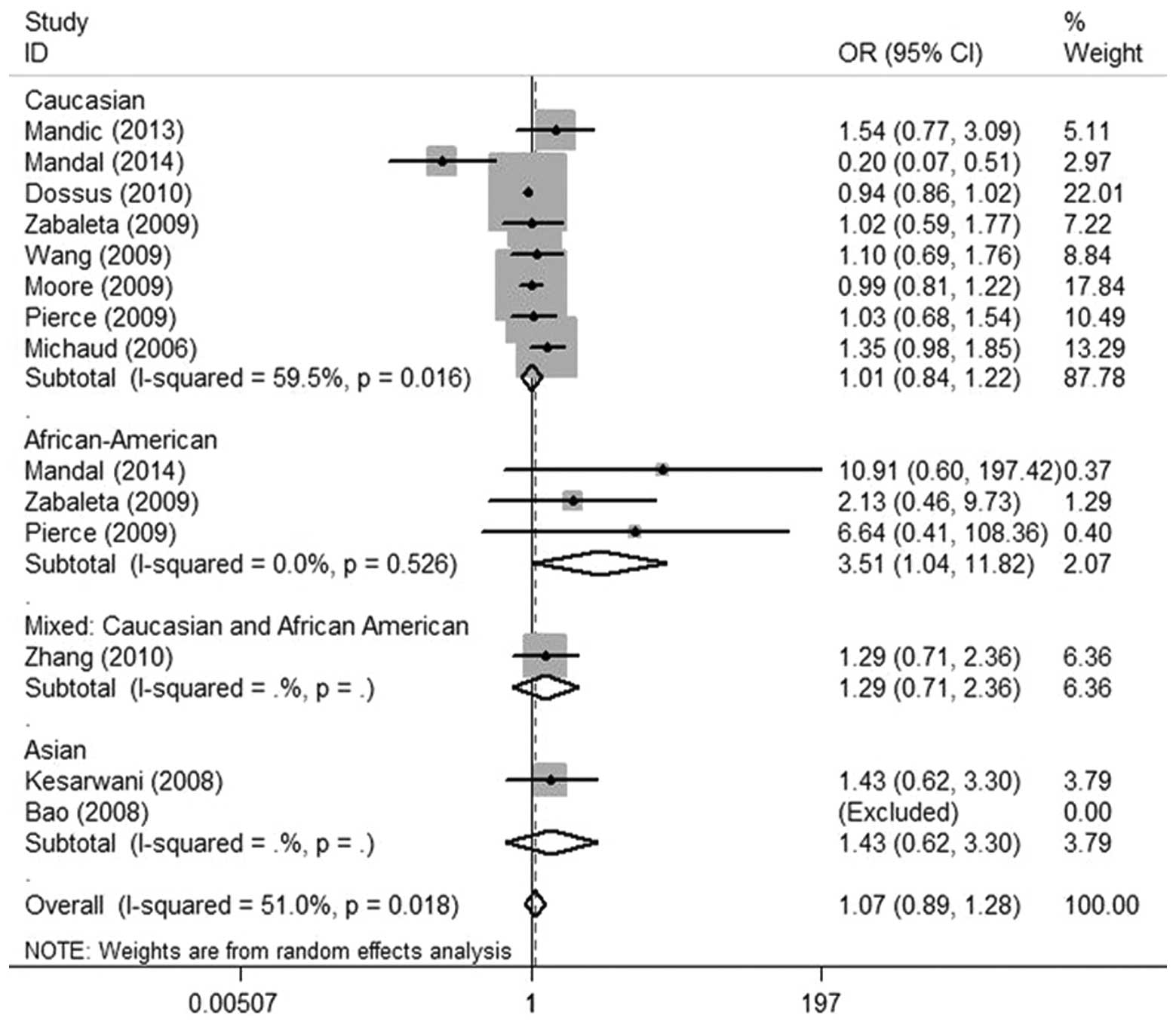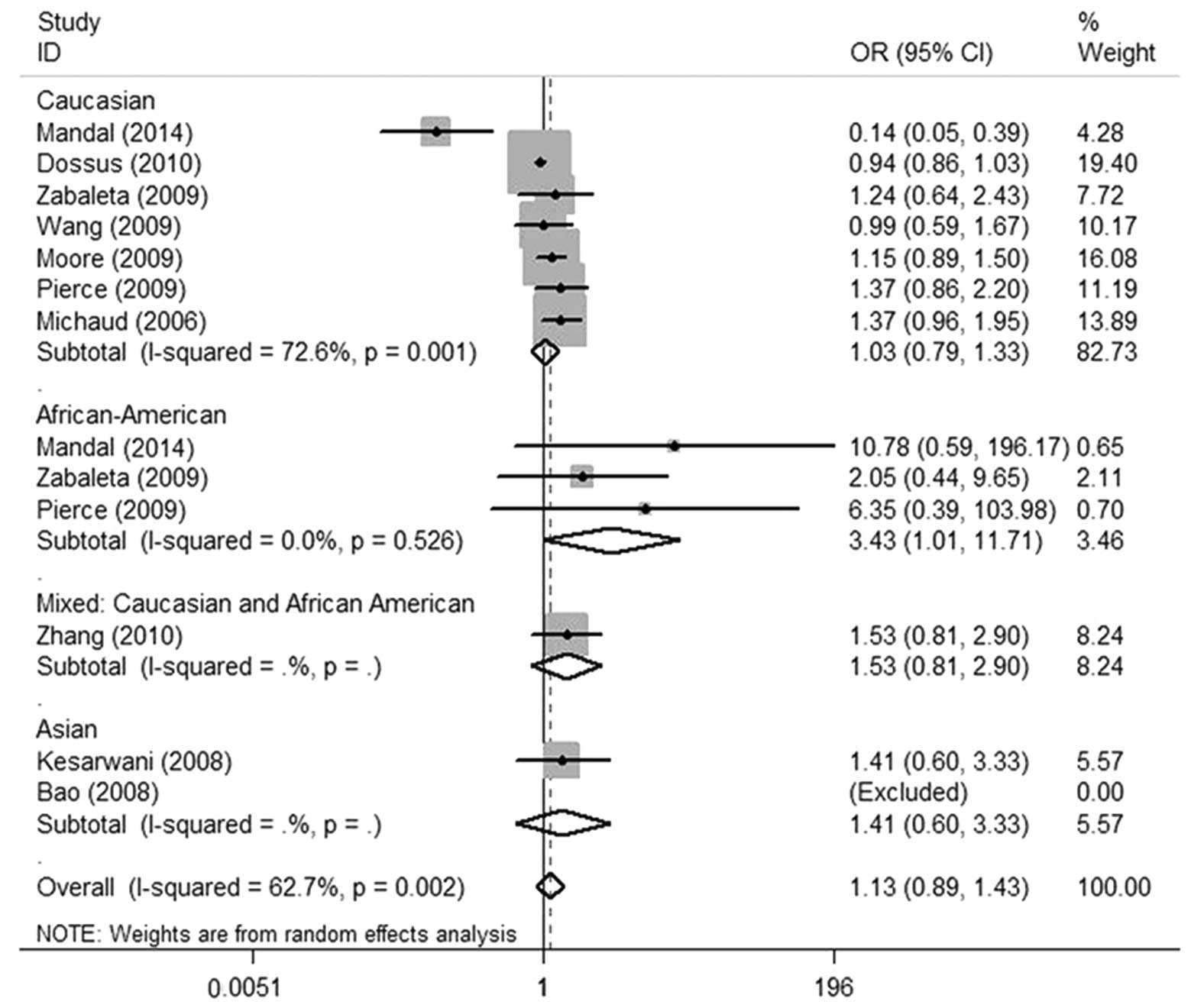|
1
|
Siegel R, Naishadham D and Jemal A: Cancer
statistics, 2013. CA Cancer J Clin. 63:11–30. 2013. View Article : Google Scholar
|
|
2
|
Discacciati A and Wolk A: Lifestyle and
dietary factors in prostate cancer prevention. Recent Results
Cancer Res. 202:27–37. 2014. View Article : Google Scholar : PubMed/NCBI
|
|
3
|
Lai GY, Giovannucci EL, Pollak MN, et al:
Association of C-peptide and leptin with prostate cancer incidence
in the Health Professionals Follow-up Study. Cancer Causes Control.
25:625–632. 2014. View Article : Google Scholar : PubMed/NCBI
|
|
4
|
Wu J and Yu E: Insulin-like growth factor
receptor-1 (IGF-IR) as a target for prostate cancer therapy. Cancer
Metastasis Rev. Jan 12–2014.(Epub ahead of print).
|
|
5
|
McGregor SE, Courneya KS, Kopciuk KA,
Tosevski C and Friedenreich CM: Case-control study of lifetime
alcohol intake and prostate cancer risk. Cancer Causes Control.
24:451–461. 2013. View Article : Google Scholar : PubMed/NCBI
|
|
6
|
Rundle A, Jankowski M, Kryvenko ON, Tang D
and Rybicki BA: Obesity and future prostate cancer risk among men
after an initial benign biopsy of the prostate. Cancer Epidemiol
Biomarkers Prev. 22:898–904. 2013. View Article : Google Scholar : PubMed/NCBI
|
|
7
|
Nelson WG, Demarzo AM and Yegnasubramanian
S: The diet as a cause of human prostate cancer. Cancer Treat Res.
159:51–68. 2014. View Article : Google Scholar : PubMed/NCBI
|
|
8
|
Sfanos KS, Isaacs WB and DeMarzo AM:
Infections and inflammation in prostate cancer. Am J Clin Exp Urol.
1:3–11. 2013.
|
|
9
|
Kwon OJ, Zhang L, Ittmann MM and Xin L:
Prostatic inflammation enhances basal-to-luminal differentiation
and accelerates initiation of prostate cancer with a basal cell
origin. Proc Natl Acad Sci USA. 111:E592–E600. 2014. View Article : Google Scholar : PubMed/NCBI
|
|
10
|
Boikos SA, Nirschl C, Martin A, Alme A,
Harris T and Drake CG: Prostate cancer cells up-regulate PD-L1 in
response to pro-inflammatory cytokines. Cancer Res. 73(Suppl 1):
Abstract 1437. 2013. View Article : Google Scholar
|
|
11
|
Ianni M, Porcellini E, Carbone I, et al:
Genetic factors regulating inflammation and DNA methylation
associated with prostate cancer. Prostate Cancer Prostatic Dis.
16:56–61. 2013. View Article : Google Scholar : PubMed/NCBI
|
|
12
|
Miyake M, Lawton A, Goodison S, Urquidi V
and Rosser CJ: Chemokine (C-X-C motif) ligand 1 (CXCL1) protein
expression is increased in high-grade prostate cancer. Pathol Res
Pract. 210:74–78. 2014. View Article : Google Scholar : PubMed/NCBI
|
|
13
|
Dakhova O, Rowley D and Ittmann M: Genes
upregulated in prostate cancer reactive stroma promote prostate
cancer progression in vivo. Clin Cancer Res. 20:100–109. 2014.
View Article : Google Scholar : PubMed/NCBI
|
|
14
|
Heber D: Cancer and inflammation.
Immunonutrition: Interactions of Diet, Genetics, and Inflammation.
Aggarwal BB and Heber D: CRC Press; Boca Raton, FL: 101. 2014,
View Article : Google Scholar
|
|
15
|
Cheng I, Liu X, Plummer SJ, Krumroy LM,
Casey G and Witte JS: COX2 genetic variation, NSAIDs, and advanced
prostate cancer risk. Br J Cancer. 97:557–561. 2007. View Article : Google Scholar : PubMed/NCBI
|
|
16
|
Danforth KN, Hayes RB, Rodriguez C, et al:
Polymorphic variants in PTGS2 and prostate cancer risk: results
from two large nested case-control studies. Carcinogenesis.
29:568–572. 2008. View Article : Google Scholar : PubMed/NCBI
|
|
17
|
Shahedi K, Lindström S, Zheng SL, et al:
Genetic variation in the COX-2 gene and the association with
prostate cancer risk. Int J Cancer. 119:668–672. 2006. View Article : Google Scholar : PubMed/NCBI
|
|
18
|
Panguluri RC, Long LO, Chen W, et al:
COX-2 gene promoter haplotypes and prostate cancer risk.
Carcinogenesis. 25:961–966. 2004. View Article : Google Scholar : PubMed/NCBI
|
|
19
|
Woo JR, Liss MA, Muldong MT, et al: Tumor
infiltrating B-cells are increased in prostate cancer tissue. J
Transl Med. 12:302014. View Article : Google Scholar : PubMed/NCBI
|
|
20
|
Lv L, Yuan J, Huang T, et al:
Stabilization of Snail by HIF-1α and TNF-α is required for
hypoxia-induced invasion in prostate cancer PC3 cells. Mol Biol
Rep. Mar 8–2014.(Epub ahead of print).
|
|
21
|
McDonald AC, Vira MA, Vidal AC, Gan W,
Freedland SJ and Taioli E: Association between systemic
inflammatory markers and serum prostate-specific antigen in men
without prostatic disease - the 2001–2008. National Health and
Nutrition examination survey. Prostate. 74:561–567. 2014.PubMed/NCBI
|
|
22
|
Lehrer S, Diamond EJ, Mamkine B, Droller
MJ, Stone NN and Stock RG: C-reactive protein is significantly
associated with prostate-specific antigen and metastatic disease in
prostate cancer. BJU Int. 95:961–962. 2005. View Article : Google Scholar
|
|
23
|
Aulisa L, Papaleo P, Pola E, et al:
Association between IL-6 and MMP-3 gene polymorphisms and
adolescent idiopathic scoliosis: a case-control study. Spine (Phila
Pa 1976). 32:2700–2702. 2007. View Article : Google Scholar : PubMed/NCBI
|
|
24
|
Shibata N, Ohnuma T, Takahashi T, et al:
Effect of IL-6 polymorphism on risk of Alzheimer disease:
genotype-phenotype association study in Japanese cases. Am J Med
Genet. 114:436–439. 2002. View Article : Google Scholar : PubMed/NCBI
|
|
25
|
Bader H: Clinical and systemic
implications of periodontal disease susceptibility: the importance
of IL-6 polymorphism. Dentistry. 4:1872014.
|
|
26
|
Yang Z, Liang Y, Qin B and Zhong R: A
meta-analysis of the association of IL-6 -174 G/C and -572 G/C
polymorphisms with systemic lupus erythematosus risk. Rheumatol
Int. 34:199–205. 2014. View Article : Google Scholar : PubMed/NCBI
|
|
27
|
Zhang HY, Feng L, Wu H and Xie XD: The
association of IL-6 and IL-6R gene polymorphisms with chronic
periodontitis in a Chinese population. Oral Dis. 20:69–75. 2014.
View Article : Google Scholar : PubMed/NCBI
|
|
28
|
Taniguchi K and Karin M: IL-6 and related
cytokines as the critical lynchpins between inflammation and
cancer. Semin Immunol. 26:54–74. 2014. View Article : Google Scholar : PubMed/NCBI
|
|
29
|
Yao X, Huang J, Zhong H, et al: Targeting
interleukin-6 in inflammatory autoimmune diseases and cancers.
Pharmacol Ther. 141:125–139. 2014. View Article : Google Scholar : PubMed/NCBI
|
|
30
|
Mandić S, Sudarević B, Marczi S, et al:
Interleukin-6 polymorphism and prostate cancer risk in population
of Eastern Croatia. Coll Antropol. 37:907–911. 2013.PubMed/NCBI
|
|
31
|
Pierce BL, Biggs ML, DeCambre M, et al:
C-reactive protein, interleukin-6, and prostate cancer risk in men
aged 65 years and older. Cancer Causes Control. 20:1193–1203.
2009.PubMed/NCBI
|
|
32
|
Mandal S, Abebe F and Chaudhary J: -174G/C
polymorphism in the interleukin-6 promoter is differently
associated with prostate cancer incidence depending on race. Genet
Mol Res. 13:139–151. 2014. View Article : Google Scholar : PubMed/NCBI
|
|
33
|
Zhang J, Dhakal IB, Lang NP and Kadlubar
FF: Polymorphisms in inflammatory genes, plasma antioxidants, and
prostate cancer risk. Cancer Causes Control. 21:1437–1444. 2010.
View Article : Google Scholar : PubMed/NCBI
|
|
34
|
Dossus L, Kaaks R, Canzian F, et al: PTGS2
and IL6 genetic variation and risk of breast and prostate cancer:
results from the Breast and Prostate Cancer Cohort Consortium
(BPC3). Carcinogenesis. 31:455–461. 2010. View Article : Google Scholar : PubMed/NCBI
|
|
35
|
Wang MH, Helzlsouer KJ, Smith MW, et al:
Association of IL10 and other immune response- and obesity-related
genes with prostate cancer in CLUE II. Prostate. 69:874–885. 2009.
View Article : Google Scholar : PubMed/NCBI
|
|
36
|
Moore SC, Leitzmann MF, Albanes D, et al:
Adipokine genes and prostate cancer risk. Int J Cancer.
124:869–876. 2009. View Article : Google Scholar : PubMed/NCBI
|
|
37
|
Bao S, Yang W, Zhou S and Ye Z:
Relationship between single nucleotide polymorphisms in -174G/C and
-634C/G promoter region of interleukin-6 and prostate cancer. J
Huazhong Univ Sci Technolog Med Sci. 28:693–696. 2008. View Article : Google Scholar : PubMed/NCBI
|
|
38
|
Kesarwani P, Ahirwar DK, Mandhani A and
Mittal RD: Association between -174 G/C promoter polymorphism of
the interleukin-6 gene and progression of prostate cancer in North
Indian population. DNA Cell Biol. 27:505–510. 2008. View Article : Google Scholar : PubMed/NCBI
|
|
39
|
Michaud DS, Daugherty SE, Berndt SI, et
al: Genetic polymorphisms of interleukin-1B (IL-1B), IL-6, IL-8,
and IL-10 and risk of prostate cancer. Cancer Res. 66:4525–4530.
2006. View Article : Google Scholar : PubMed/NCBI
|
|
40
|
Zabaleta J, Su LJ, Lin HY, et al: Cytokine
genetic polymorphisms and prostate cancer aggressiveness.
Carcinogenesis. 30:1358–1362. 2009. View Article : Google Scholar : PubMed/NCBI
|
|
41
|
Magalhães JF, Cortinhas AF, Albuquerque
CM, et al: Interleukin-6 gene -174G>C and -636G>C promoter
polymorphisms and prostate cancer risk. Mol Biol Rep. 40:449–455.
2013.
|
|
42
|
Zhang H, Xu Y, Li L, Liu R and Ma B: The
interleukin-6 -174G/C polymorphism and prostate cancer risk: a
systematic review and meta-analysis. Urol Int. 88:447–453. 2012.
View Article : Google Scholar : PubMed/NCBI
|


















